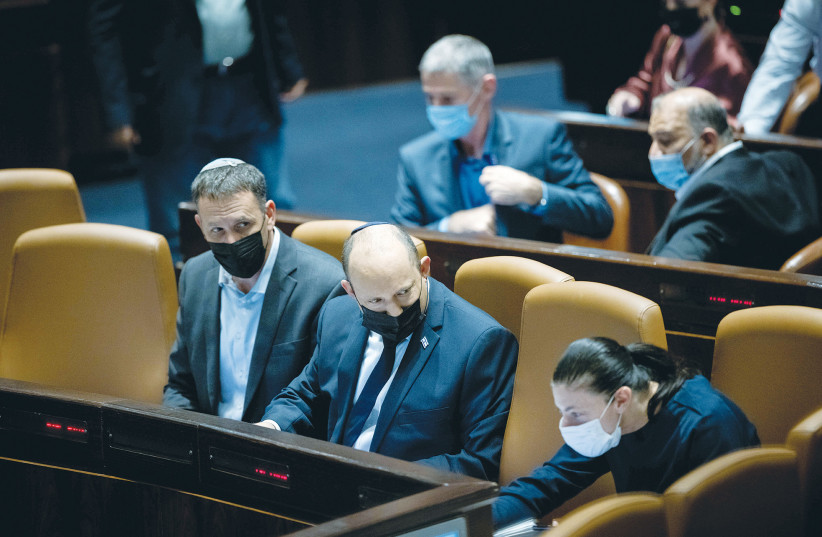It is routine for Israeli political commentators to predict that the winter assembly of the Knesset will be stormy and the summer assembly will also be heated. As the Knesset returns from its spring recess on Monday, there is, unfortunately, every reason to think that the coming period will be a fiery one.
Following the defection of Yamina MK and coalition chairman Idit Silman five weeks ago, there is a 60-60 tie between the coalition and opposition within the 120-member parliament. Adding to Prime Minister Naftali Bennett’s headaches is the fact that Ra’am (the United Arab List), led by Mansour Abbas, also froze its membership of the coalition due to the clashes on the Temple Mount.
Abbas is caught in a difficult situation as his political future depends on the survival of the government that he joined, but there will likely be legislation and other government actions that make it difficult for the party to remain in the coalition without antagonizing its own voters.
Bennett had hoped to focus on consensus issues to satisfy diverse coalition partners. But this has been shown not to be sustainable when reality kicks in. Any promise to one side requires a similar guarantee to the other. Committing to hooking up illegal Arab communities to the electric grid to keep Ra’am happy means an expectation – even by members of Bennett’s Yamina Party – of legalizing settler outposts and building in Judea and Samaria.
With the prime minister now holding only five Knesset seats, the balancing act has become even harder. Just witness the struggle to find a coalition whip to replace Idit Silman from within Yamina. There is already much speculation that Yamina No. 2, Interior Minister Ayelet Shaked, could link up with Nir Orbach and Abir Kara to split from the party and form their own faction.

Opposition leader Benjamin Netanyahu is obviously seeking the downfall of this government and is actively trying to woo current coalition MKs to his side. He would like to see the Knesset dispersed and a new round of elections held, which he believes would return him to power.
And, although it is an unlikely scenario, there are those who would not mind seeing the government’s replacement from within the Knesset, which requires a constructive majority of 61 agreeing on an alternative candidate for prime minister.
The neck-in-neck coalition-opposition in the legislature gives individual MKs more power. This can be used, for want of a better word, to blackmail the government.
The ramifications of the political stalemate are especially serious given the nature of the issues on the agenda, which include dealing with the wave of Palestinian terror, US-Israel relations, the Iran nuclear deal and the fallout of the Russian invasion of Ukraine. These, of course, are in addition to domestic issues such as the price of housing, the growing socio-economic gap, religious-secular tension and more.
Part of the problem stems from the nature of the Israeli political system. It has been noted that after American presidential elections, it is assumed that the new president will be in power for at least four years, whereas in Israel, the start of a new government’s tenure signals the beginning of the next election cycle and attempts to remove it as soon as possible. This is not healthy.
It is the duty of a responsible government and a functioning opposition to ensure that this does not spill over into petty politics, incitement and the complete abandonment of all principles. The public, too, should be aware of the price of the lack of political stability.
The Knesset is beginning the summer assembly in a state of political paralysis, with neither side enjoying a majority. The coalition will find it hard to continue to function, while the opposition will find it difficult to muster the necessary majority to go back to the ballot box.
Stuck in the middle is the country, which needs to keep functioning and to continue its positive economic trajectory.
The fate of this coalition could be decided in the coming weeks and will be whatever it is. But we ask the MKs who return to the Knesset this week to remember: The public can’t be expected to respect the Knesset when its own members demonstrably show a lack of respect for each other.
